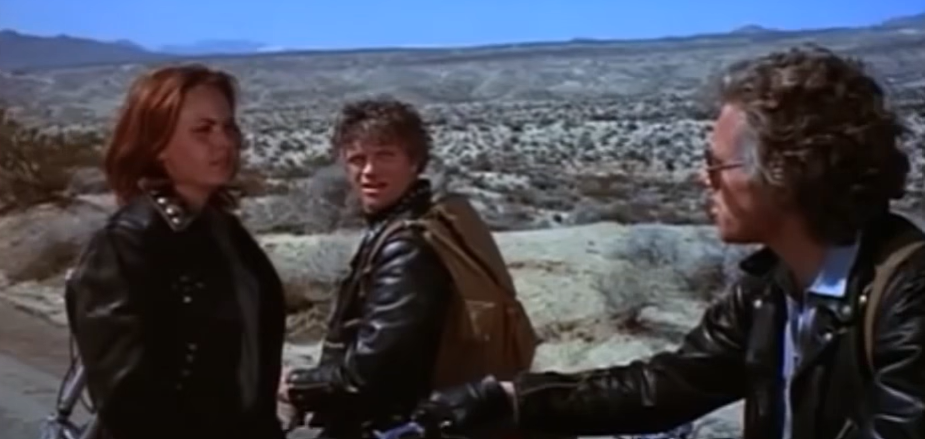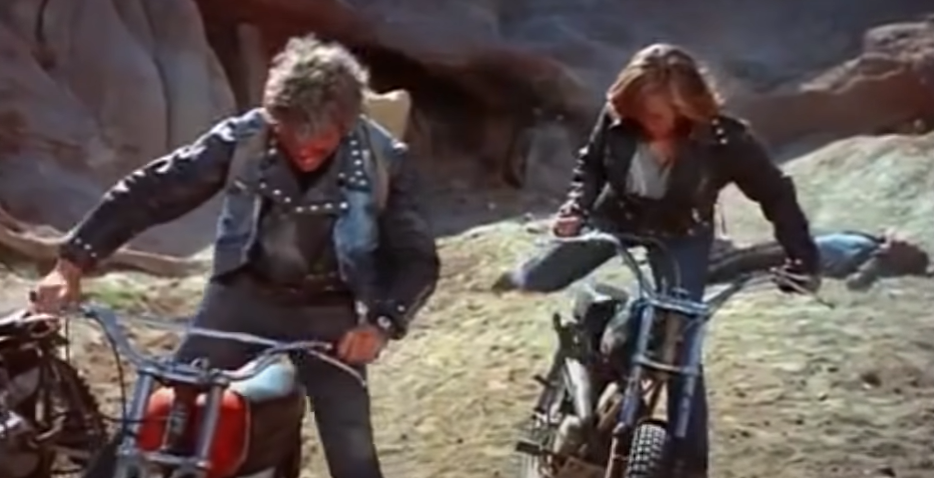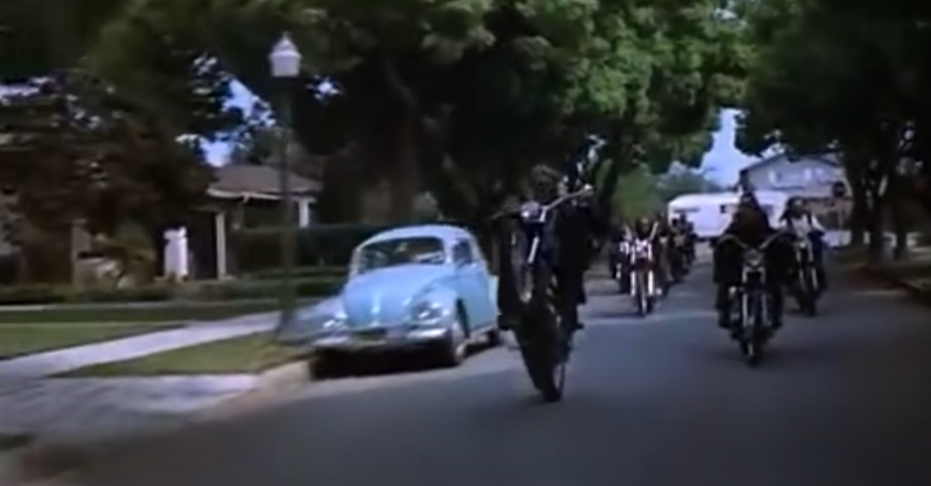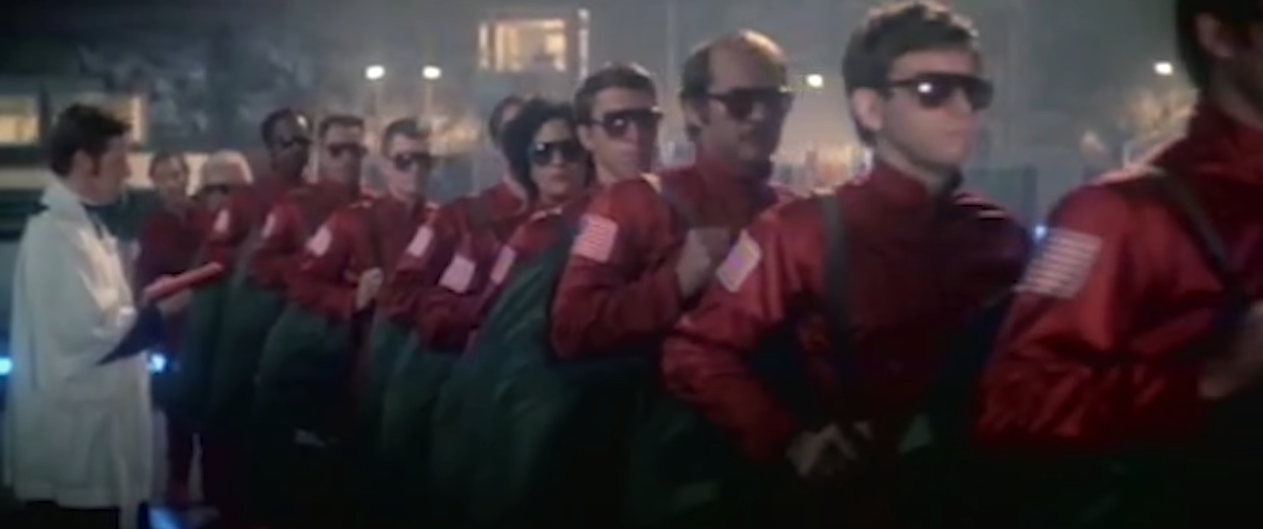The 1970s were a significant period in cinematic history, particularly for biker movies. This genre, teetering on the fringes of mainstream cinema, captivated audiences worldwide with its unique blend of rebellion, camaraderie, and the sheer exhilaration of the open road. Biker movies not only offered a new perspective on freedom but also challenged societal norms, thus resonating with the countercultural sentiments of the time.
A Revolution on Wheels: Groundbreaking Biker Movies of the 70s
The 1970s marked a significant decade for cinema globally, but one genre that particularly flourished during this era was that of biker films. Building upon the groundwork laid in the late ’60s, these movies not only explored the biker subculture in all its gritty realism but also tapped into the era’s countercultural movements, socio-political upheaval, and the spirit of rebellion. The resulting cinematic depictions fostered a unique blend of storytelling, raw performances, and innovative film-making techniques, making these groundbreaking biker movies a defining feature of 70s cinema.
Easy Rider (1969)
While ‘Easy Rider’ officially premiered in the late ’60s, its influence reverberated throughout the 70s, thus earning its rightful place in this list.
Key Aspects of Easy Rider:
- Plot: It follows the cross-country journey of two bikers, Wyatt (Peter Fonda) and Billy (Dennis Hopper), as they travel from Los Angeles to New Orleans. On their journey, they encounter varying aspects of American society, with the narrative underscoring themes of freedom, the open road, and the disillusionment with the American dream;
- Cast: Directed by Dennis Hopper, the film features a powerhouse trio of Hopper, Peter Fonda, and Jack Nicholson. Each actor brought forth memorable performances that remain etched in cinematic history;
- Impact: ‘Easy Rider’ revolutionized independent filmmaking, and its influence extended to the music industry with a soundtrack that captured the essence of the era’s rock culture. The film’s exploration of the biker subculture, juxtaposed with socio-political commentaries, made it a trendsetter for biker films in the 70s.
The Wild Angels (1966)
Peter Fonda makes a repeat appearance on this list, this time with ‘The Wild Angels,’ a film that served as a precursor to the surge of biker movies in the 70s.
Key Aspects of The Wild Angels:
- Plot: The story revolves around a biker gang leader’s quest to recover a stolen motorcycle, providing a raw, unfettered look into the world of the notorious Hell’s Angels Motorcycle Club;
- Cast: Peter Fonda leads the cast as the biker gang leader, while Nancy Sinatra and Bruce Dern support his powerful performance;
- Impact: Directed by Roger Corman, the ‘King of B-Movies,’ ‘The Wild Angels’ helped lay the groundwork for the biker movie genre in the 70s. Its depiction of biker gangs’ violent, anarchic lifestyle brought the subculture to mainstream attention.
Psychomania (1973)
‘Psychomania’ broke the conventions of the typical biker movie, infusing elements of horror and the supernatural into the genre.
Key Aspects of Psychomania:
- Plot: This British film follows a biker gang, The Living Dead, who come back to life after committing suicide. With the freedom of immortality, they engage in reckless, violent antics without fear of consequences;
- Cast: The film stars Nicky Henson as the gang leader, supported by Mary Larkin and Ann Michelle. The performances, coupled with the unique narrative, created a truly surreal cinematic experience;
- Impact: ‘Psychomania’ stands as a testament to the experimental spirit of 70s cinema. By combining biker and horror genres, it created a niche cult following, becoming a forerunner for later cross-genre biker films.
Cultural Context and Impact

The 1970s were a transformative period for global culture, marking a distinctive shift in societal norms and values. The world was undergoing rapid changes with youth movements, political unrest, and growing disillusionment with establishment systems. Within this broader cultural context, a new form of cinematic expression emerged: the biker film. Movies like “Easy Rider” (1969), “The Wild One” (1970), and “Mad Max” (1979) struck a chord with audiences, reflecting the era’s prevailing themes of rebellion, freedom, and nonconformity.
Counterculture Influence: Rebellion Against Traditional Values
The 1970s was a period marked by rapid social and cultural change. One of the most distinctive aspects of this era was the counterculture movement, a wave of rebellion against traditional values and norms. A significant manifestation of this was seen in the realm of cinema, particularly in biker films.
Biker films from this period fundamentally challenged the mainstream societal expectations and conventions, representing an act of rebellion against traditional values. These films became platforms for unconventional narratives and unconventional characters that reflected the sentiment of the counterculture movement.
Key Features of the 1970s Biker Films
| Feature | Description |
|---|---|
| Symbol of Rebellion | The bikers, as portrayed in these films, were often depicted as rebellious individuals living on the societal periphery, pushing against accepted norms. |
| Anti-hero Protagonists | Unlike conventional films, biker movies of this period often featured anti-heroes as their main characters. These were characters that did not adhere to the traditional attributes of heroism, creating a new archetype that resonated with audiences feeling alienated from society. |
| Challenging Authority | A consistent theme in these films was the anti-establishment sentiment. Conflicts with law enforcement and other symbols of authority were frequently portrayed, mirroring the disillusionment many felt towards the institutions that represented the establishment. |
The rebellion against traditional values as seen in 1970s biker films left a significant impact on both the film industry and society. It helped to redefine the concept of a protagonist and presented audiences with new, relatable character archetypes.
- Industry Impact: This sub-genre of films challenged the Hollywood formula, resulting in a shift towards more character-driven and thematically complex narratives. It paved the way for the creation of movies that feature anti-heroes, flawed protagonists, and stories that question societal norms and institutions;
- Societal Impact: On a societal level, these films further amplified the voices of the counterculture movement. By portraying characters living outside societal norms and fighting against the system, they resonated with many viewers, contributing to a broader societal dialogue about individualism, authority, and societal norms.
The 1970s biker films were not just a genre of entertainment but served as a mirror to the society of the time. Through their rebellious themes and unconventional characters, these films reflected a society in the throes of change, expressing the zeitgeist of an era marked by an evolving counterculture.
The Open Road: A Metaphor for Freedom
The concept of the open road played a significant role in the narrative and thematic construction of 1970s biker films. It served not only as a setting but also a potent metaphor for freedom, nonconformity, and self-discovery. This theme resonated with audiences of the era, many of whom felt the strain of societal expectations and craved the liberty to explore their individual identities and destinies.
The Open Road as a Metaphor in 70s Biker Films
| Metaphor | Description |
|---|---|
| Unfettered Freedom | The open road symbolized a world without constraints. It represented a limitless, boundless space where the protagonist, riding their motorcycle, could exercise their independence and free will. The motorcycle in these narratives was not just a vehicle, but an instrument of freedom. |
| Nonconformity | As a recurring theme, the open road also served as a metaphor for nonconformity. In these films, bikers were depicted as societal outsiders, living a life beyond the traditional societal structures and norms. |
| Self-Discovery | The open road was often the stage for the protagonist’s journey of self-discovery. These journeys, filled with challenges and adventures, led to personal growth and transformation. This narrative arc mirrored the quest for identity that characterized much of the era’s youth culture. |
The metaphor of the open road and the themes it embodied left a significant mark on cinema and resonated deeply with audiences.
- Cinematic Impact: This metaphor ushered in a narrative shift in cinema, giving rise to films centered around the idea of a journey as a means of character development and personal growth. This shift is seen not only in biker films but also in other genres of the era and beyond;
- Audience Resonance: The themes of freedom, nonconformity, and self-discovery that the open road metaphor represented resonated with many viewers. It echoed their feelings of being constrained by societal norms and their desire for personal freedom and self-definition.
The open road as a metaphor in 70s biker films was a powerful narrative device that captured the spirit of the era. It tapped into the societal longing for freedom and nonconformity, and resonated with audiences on a deep, personal level. These films, in their portrayals of bikers exploring the open road, encapsulated the countercultural sentiment and the desire for self-discovery that marked the 1970s.
Cultural Impact: Changing Perceptions and Norms
The biker films of the 70s did more than just entertain; they influenced societal perceptions and norms, redefining heroism, challenging authority, and promoting nonconformity. This genre resonated with a demographic that was witnessing similar societal transformations, leading to a significant cultural impact.
Cultural Influences of 70s Biker Films
| Influence | Description |
|---|---|
| Reimagining Heroism | The traditional concept of a hero was upturned by these films. The protagonists were not knight-in-shining-armor figures, but flawed and complex characters who operated outside the realm of societal norms. This challenged audiences to reconsider their notions of what constituted heroism. |
| Challenging Authority | 70s biker films echoed the wider societal trend of questioning authority and institutional distrust. By portraying conflicts between bikers and law enforcement, these films brought to the screen the sentiments felt by many, prompting a significant cultural shift. |
| Promoting Nonconformity | The films were a celebration of nonconformity and rebellion, depicting characters that lived by their own rules. This had an influence on cultural attitudes towards individual freedom and autonomy, inspiring viewers to value their own individuality. |
The biker films of the 70s significantly influenced society by pushing against societal norms and changing the cultural landscape.
- Changed Perceptions of Heroism: Biker films have contributed to a shift in the archetype of a hero. Today, complex and flawed characters have become a staple in cinema, reflecting the influences of the 70s biker films;
- Questioning Authority: The anti-establishment themes seen in these films have continued to resonate, influencing other forms of media and contributing to ongoing conversations about the role and reliability of institutions;
- Celebration of Nonconformity: The value placed on individualism and nonconformity in these films has permeated into broader cultural attitudes. The celebration of rebellion and autonomy continues to be a significant theme in contemporary media and societal discourse.
The cultural impact of 70s biker films extends beyond cinema. They challenged the status quo, influenced societal norms, and contributed to shaping modern-day perceptions of heroism, authority, and nonconformity.
Signature Style and Aesthetic
The biker films of the 70s distinguished themselves with a distinctive style and aesthetic that went on to become genre hallmarks. From motorcycle iconography to soundtrack selection to cinematography, these films established an unmistakable identity that added depth to the narrative and resonated with the audience.
Signature Elements of 70s Biker Movies
| Element | Description |
|---|---|
| Motorcycle Iconography | Motorcycles, particularly the chopper-style bikes, were more than mere props in these films. They became potent symbols of freedom and rebellion, encapsulating the core ethos of the genre. |
| Soundtrack | Music was an integral part of these films, often featuring genres like rock and roll or folk music that complemented and accentuated the countercultural themes. The soundtracks not only set the mood but also deepened the emotional resonance of the narratives. |
| Cinematography | The films employed various shooting techniques to convey the exhilaration of the open road. Long shots of open highways captured the boundless sense of freedom, close-ups of revving engines heightened the sense of raw power and excitement, and POV shots from the biker’s perspective further immersed the audience in the biker’s world. |
The distinctive style and aesthetic of 70s biker movies had a significant influence on the filmmaking and viewer experience.
- Influencing Filmmaking: These films introduced a unique blend of iconography, music, and cinematography that influenced the stylistic choices of many films in the genre and beyond. It was an aesthetic that marked a departure from traditional cinematic norms, aligning perfectly with the countercultural narratives they portrayed;
- Enhancing Viewer Experience: The unique style and aesthetic of these films played a crucial role in engaging audiences and deepening their emotional connection to the narratives. The use of powerful symbols, resonant soundtracks, and immersive cinematography served to amplify the themes of rebellion, freedom, and nonconformity.
The signature style and aesthetic of 70s biker movies played a crucial role in defining the genre and enhancing its impact. The use of potent motorcycle iconography, culturally resonant soundtracks, and innovative cinematography created a unique movie-going experience that resonated deeply with audiences and left a lasting imprint on the genre.
The Legacy Lives On: Biker Movies in Contemporary Cinema

| Title | Year | Director | Description |
|---|---|---|---|
| The Ride | 2020 | Liam MacRae | This action-packed drama tells the story of a biker gang in post-apocalyptic Los Angeles. The film beautifully incorporates elements of science fiction and fantasy. |
| Lady Rebels | 2021 | Anna Rose Holmer | A female-led biker film that redefines the genre norms. It showcases the journey of a group of women who form their own motorcycle club. |
| Two Wheels and a Dream | 2022 | Carlos López Estrada | A coming-of-age tale set in Mexico that explores the local bike culture and the societal pressures faced by the young protagonist. |
Key Trends in Contemporary Biker Movies
- Genre Blending: This has become an increasingly popular trend in contemporary biker movies. Filmmakers are incorporating elements from different genres such as action, sci-fi, drama, and fantasy to create a more unique cinematic experience that appeals to a wider audience;
| Biker Movie | Blended Genres |
|---|---|
| The Great Escape | Action, Adventure, Drama |
| Hell Drivers | Drama, Crime, Thriller |
| Knight Riders | Action, Drama, Adventure |
- Global Perspectives: The biker movie genre has expanded beyond Hollywood to encompass filmmakers around the world. These international creators utilize the genre to tell stories unique to their experiences, incorporating cultural nuances and local realities;
| Biker Movie | Country |
|---|---|
| Biker Movie | Country |
| Akira | Japan |
| The Motorcycle Diaries | Argentina |
| Sholay | India |
- Empowered Female Characters: An increasing number of films are showcasing strong female bikers, reflecting societal changes and moving away from the male-dominated narratives of the past.
| Biker Movie | Lead Female Character |
|---|---|
| Lady Rebels | Lara Hughes |
| Hellcat’s Revenge | Kat |
| Biker Boyz | Queenie |
Notable Homages to Classic Biker Films
- “The Ride” pays a cinematic tribute to the 1979 cult classic “Mad Max” with its dystopian setting and raw, uncompromising action scenes;
- “Lady Rebels” draws inspiration from “The Wild One” in its themes of rebellion and independence, whilst flipping the gender script to portray women in leading roles;
- “Two Wheels and a Dream” mirrors the spirit of “Easy Rider”, giving a modern touch to the exploration of counterculture and personal freedom.
Cultural Impact of Biker Movies
- Fashion Influence: Biker aesthetics have significantly influenced global fashion trends, with leather jackets, boots, and bandanas becoming popular streetwear items;
- Vintage Motorcycle Resurgence: Contemporary biker films have triggered a resurgence of interest in vintage motorcycles, attracting both collectors and hobbyists;
- Music: Biker movie soundtracks, usually dominated by rock and roll or blues music, have significantly influenced mainstream music playlists.
Biker Movie Festivals
- The Wheels and Reels Film Festival: This annual event held in Los Angeles celebrates the magic of biker films, showcasing both classic and contemporary works;
- The Moto Film Fest: Based in New York, this festival offers a unique blend of motorcycles, film, and art, promoting independent filmmakers and artists;
- The Wild One Film Festival: Held in London, this festival pays tribute to the iconic biker movie, “The Wild One”, featuring films from diverse cultural backgrounds.
Conclusion
Biker movies of the 1970s, often overlooked in the broader context of cinema, had an indelible impact on the film industry. Their unique aesthetic, coupled with their echo of the countercultural movement prevalent at the time, carved a distinctive niche for themselves in the annals of film history. The ingenuity and depth they introduced remain a testament to their artistic contribution, reflecting the unbounded spirit of the open road in their narratives.
As we venture back into the world of these cinematic treasures, we not only rediscover their originality, but also appreciate their encapsulation of a freewheeling spirit that remains evergreen. Their timeless charm lies in the raw depiction of liberty that the open road signifies, serving as a compelling symbol that continues to resonate. In essence, 70s biker movies embody an irreplaceable fragment of cinematic history, mirroring an era that cherished the allure of freedom and rebellion.
FAQ
The 70s was a time of societal change and countercultural movements, which found reflection in biker movies. The themes of rebellion and freedom resonated with audiences, leading to the genre’s popularity.
Biker movies from the 70s laid the groundwork for many action and road movies that followed. Their unique storytelling style and exploration of counterculture have been influential in shaping modern cinema.
Directors like Roger Corman and Dennis Hopper were renowned for their contributions to the biker movie genre in the 70s.




